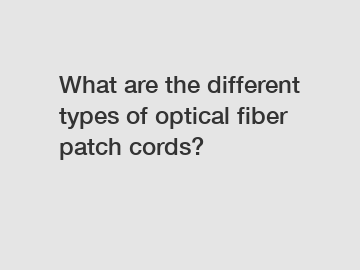What are the different types of optical fiber patch cords?
What are the different types of optical fiber patch cords?
In today’s technologically advanced world, optical fiber patch cords play a crucial role in enabling high-speed data transmission and communication. These patch cords are used to connect different devices like computers, routers, optical switches, and servers. They are an essential component of any network infrastructure, ensuring smooth and uninterrupted data transfer. However, not all patch cords are the same, and they come in different types, each designed for specific networking requirements. In this article, we will explore the various types of optical fiber patch cords and their applications.
1. Single-mode patch cords:

Single-mode patch cords are designed to carry a single ray of light over longer distances with minimal loss or dispersion. They have a smaller core diameter compared to multi-mode patch cords, typically around 9 microns. These patch cords are ideal for long-distance transmission applications, such as data centers, telecommunications networks, and long-haul connections.
2. Multi-mode patch cords:
Multi-mode patch cords have a larger core diameter, usually around 50 or 62.5 microns. This allows multiple rays of light to travel simultaneously, resulting in higher data transmission capacity but shorter reach. They are commonly used in local area networks (LANs), short-distance connections, and applications where the length of the fiber optic cable is limited.
3. Simplex patch cords:
Simplex patch cords consist of a single fiber and are used for applications that require only one-way communication, such as video streaming or broadcasting. They are often color-coded for easy identification and are available in both single-mode and multi-mode options.
4. Duplex patch cords:
Duplex patch cords contain two fibers, allowing for bi-directional communication. They are commonly used in applications like network switches or network interface cards (NICs) where simultaneous transmission and reception of data are required. Duplex patch cords are also color-coded, with one fiber colored for easy identification during installation and maintenance.
5. Armored patch cords:
Armored patch cords are reinforced with a strong metal sheath, providing extra protection against damage caused by bending, crushing, or rodent bites. These patch cords are often used in harsh environments, outdoor installations, or areas where there is a higher risk of cable damage. Armored patch cords are available in both single-mode and multi-mode variants.
6. Mode-conditioning patch cords:
Mode-conditioning patch cords are used in Gigabit Ethernet applications to overcome the limitations of older multi-mode fibers. They are primarily used in situations where multi-mode fibers are deployed for longer distances than initially intended. Mode conditioning patch cords improve the transmission quality and distance by aligning the light sources with the fiber’s core, eliminating the modal dispersion issue.
In conclusion, optical fiber patch cords come in various types and configurations to meet different networking requirements. Whether it is for transmitting data over long distances or short-range connections, the right patch cord is crucial to ensure reliable and efficient connectivity. By understanding the different types of optical fiber patch cords – single-mode, multi-mode, simplex, duplex, armored, and mode-conditioning – network administrators can choose the most suitable option for their specific needs.
If you have any further questions or require assistance in selecting the right optical fiber patch cords for your network, please do not hesitate to contact us. Our team of experts is ready to provide you with the guidance and support you need.
Want more information on fiber optic patch panel manufacturers, multichannel audio cable, China Fiber Optic Cables? Feel free to contact us.

Comments
0